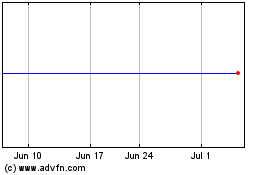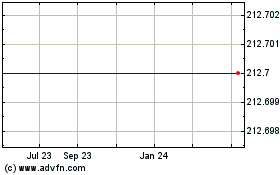Insurer indicated it would exit exchanges if authorities
targeted deal with Humana
By Anna Wilde Mathews and Stephanie Armour
Aetna Inc. told Justice Department antitrust officials in a
letter early last month that if they sued to block its deal to
acquire Humana Inc., it would immediately reduce its presence on
the Affordable Care Act health-insurance exchanges and cancel a
planned expansion.
The public emergence of the bluntly worded letter, from Aetna's
Chief Executive Mark T. Bertolini, has led critics to question the
motives behind the insurance company's recently disclosed pullback
from the insurance exchanges. It also has added a layer to a
broader debate over the causes and cures for the red ink the
exchanges are generating for insurers.
In the letter, which came in response to a request from the
Justice Department, Mr. Bertolini said Aetna believed "it is very
likely that we would need to leave the public exchange business
entirely and plan for additional business efficiencies should our
deal ultimately be blocked."
On Monday, a few weeks after the Justice Department filed suit
to block the deal, Aetna announced that it would withdraw from 11
of the 15 state exchanges where it sells health plans. The company
cited its mushrooming financial losses from the exchange business,
echoing other major insurers that are also pulling back from the
exchanges, including UnitedHealth Group Inc.
A Justice Department spokesman declined to comment on the July
letter or on whether it influenced the department's scrutiny of the
Humana deal. News of the letter was reported earlier by the
Huffington Post.
Insurers, including many that aren't withdrawing, say they have
struggled with medical costs that were higher than expected, as
well as with what they say are regulatory issues and flaws in
certain aspects of the exchange programs. They are pushing for
changes in the marketplaces.
"This population is sicker, with more conditions than expected,
and that drove up the costs," said Patrick Getzen, chief actuary at
Blue Cross and Blue Shield of North Carolina, whose losses on ACA
plans deepened last year to $282 million from $123 million in 2014,
the exchanges' first year.
Insurers are seeking changes to bring in healthy enrollees,
including a stronger penalty for those lacking coverage, Mr. Getzen
said, as well as "better policing to ensure the system is not being
gamed," such as when consumers sign up for plans outside the annual
open-enrollment period to cover immediate medical needs.
The Obama administration has said the law's marketplaces are
generally succeeding, and pointed out that some insurers are
profitable while arguing that others would get into the black if
they made adjustments. The administration also points to a series
of tweaks it has already made aimed at bolstering the marketplaces,
including some moves to limit off-season enrollment and planned
efforts to entice more young people to buy plans.
"Companies are adapting at different rates to a market where
they compete for business on cost and quality, rather than by
denying coverage to people with preexisting conditions," said a
spokesman for the Department of Health and Human Services.
Aetna had losses of $200 million on ACA plans in the second
quarter, which it said accounted for nearly half of its total
losses on individual health coverage since the exchange plans
debuted in January 2014. The insurer said that after the July
letter was sent, "we then gained full visibility into our second-
quarter individual products loss, which is what ultimately drove us
to narrow our 2017 public exchange presence."
An Aetna spokesman tied the losses to higher-than-expected
medical costs and the inadequacy of a health-law program designed
to ease that risk, saying, "that's not politics, that's financial
reality, which some choose to ignore."
The letter drew questions from some Democratic supporters of the
health law. "This letter is disturbing and appears to confirm our
suspicions that Aetna's decision to scale back its participation in
the Affordable Care Act marketplaces was part of an effort to
strong-arm the Obama administration into approving a controversial
merger with Humana," said Rep. Frank Pallone of New Jersey.
An Aetna spokesman declined to comment on Rep. Pallone's
remark.
In the July 5 letter, Aetna's Mr. Bertolini pointed to financial
pressures, saying the company would have additional costs and
wouldn't reap savings from the merger if the Humana combination
were delayed or destroyed. He wrote that if the Humana deal drew a
legal challenge, "instead of expanding to 20 states next year, we
would reduce our presence to no more than 10 states."
Earlier this month, Mr. Bertolini said Aetna had seen
double-digit cost increases from its ACA enrollees, with specialty
drugs being a major driver. He pointed to "structural challenges"
in the exchanges, including limits to a risk-adjustment program
that was supposed to help smooth costs for insurers. He also said
there were significant costs tied to enrollees whose premiums were
paid by third parties potentially affiliated with health-care
providers or other interested parties.
The Health and Human Services Department released a report last
week that said costs for ACA-plan enrollees were roughly flat
between 2014 and 2015, even as costs in the broader insurance
market rose. The report said insurers likely underpriced their
premiums in 2014, due to a lack of information and desire to win
market share, and then didn't make up the ground adequately in
pricing for 2015 -- leading to losses.
But industry officials questioned its conclusions. "It's just
not reflective of the experience of Blue Cross Blue Shield plans,"
said Alissa Fox, a senior vice president at the Blue Cross Blue
Shield Association. "We've just seen the costs of people
increasing." Blue insurers are major players in nearly all the
exchanges.
--Brent Kendall contributed to this article.
Write to Anna Wilde Mathews at anna.mathews@wsj.com and
Stephanie Armour at stephanie.armour@wsj.com
(END) Dow Jones Newswires
August 18, 2016 02:48 ET (06:48 GMT)
Copyright (c) 2016 Dow Jones & Company, Inc.
Aetna (NYSE:AET)
Historical Stock Chart
From Mar 2024 to Apr 2024

Aetna (NYSE:AET)
Historical Stock Chart
From Apr 2023 to Apr 2024
